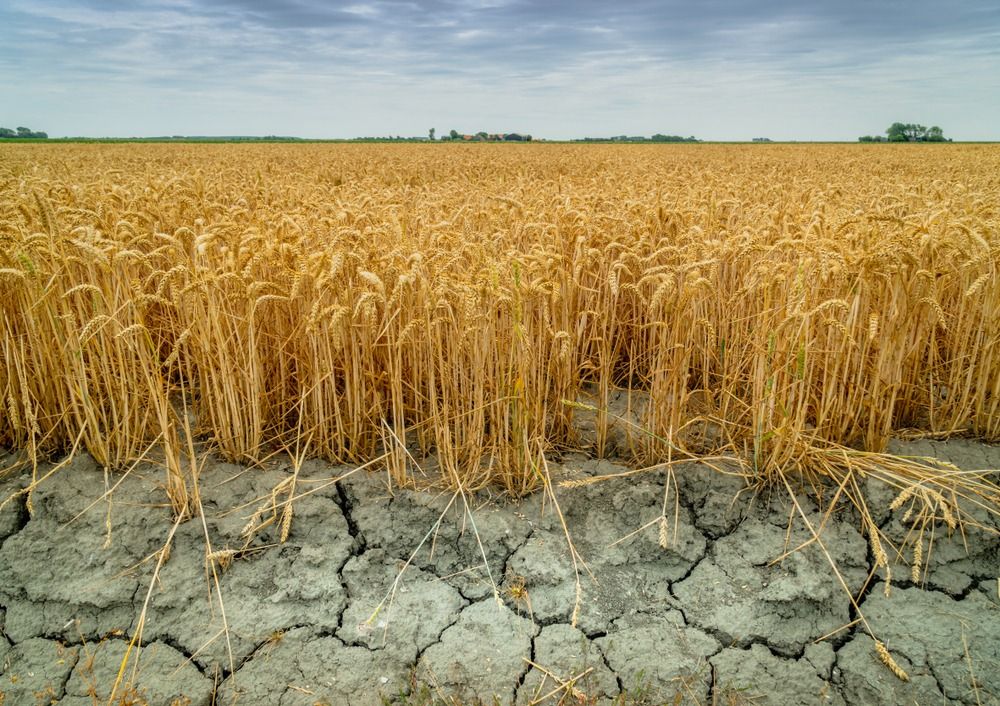Climate change is bad for the global food supply. Print me a steak.
By Thomas Gaulkin | June 10, 2019

“The most terrifying image of climate change is not ocean waves crashing over a seawall. It is of a sun-baked field of wheat, parched and abandoned, its blighted soil drained of life.”
A pair of recent studies dive into the numbers behind that bleak picture painted by Frederick Hewett in a recent commentary for Boston’s WBUR. Climate change is already affecting the world’s food production, and it’s probably going to get worse, they conclude.
Researchers from the University of Minnesota Institute on the Environment and the University of Copenhagen published a statistical analysis of global yields for 10 major agricultural crops (like maize, soybean, and wheat) between 1974 and 2013. Comparing observed weather data across that time period with known crop yields, they assessed the impact of rising global temperatures. They found that global yields are down slightly overall, but like many effects of climate change, the impact on certain populations is unequal. While some Western European nations have seen worrying downward trends in food production, half of the most vulnerable and food insecure nations, primarily in Africa, are already experiencing the worst declines in crop yield. Meanwhile, Latin America and the midwestern United States have seen rising yields for certain crops that are hardier and fare better in warmer temperatures.
The researchers suggest that the recent variety in agricultural productivity within certain regions should motivate more research into the other factors like local farming circumstances and methods that led some areas to achieve higher yields. That does seem like a good idea.
But according to another statistical analysis also published last week, global warming will eventually make even the hardiest crops less bountiful. Comparing variations in farming conditions and crop yields across the past four decades with temperature projections for 2050-2100, experts at Cornell University and New Mexico Tech concluded that heat stress from a warming planet will soon overtake soil moisture as the primary factor affecting crop yields in the United States. And in the best future predicted by the Intergovernmental Panel on Climate Change—in which carbon dioxide emissions basically peak tomorrow and average global temperature increases by less than 1.5 degrees Celsius—yields for the top six major US crops are predicted to decrease by 8 percent to 19 percent. In the worst scenario—a 5 degrees Celsius increase—projected yield losses reach nearly 50 percent.
If that doesn’t seem good, wait until you hear some of the solutions. On NPR’s Fresh Air last week, Terry Gross spoke with Amanda Little, the author of The Fate of Food: What We’ll Eat in a Bigger, Hotter, Smarter World. Little also talked about the challenges to food production in the United States as a result of climate change, but the conversation focused more on new approaches to making food on a less fertile planet, from relatively inoffensive notions like vertical farming to sci-fi eyebrow-raisers like real meat that’s grown in labs. As with many technologies you didn’t know you needed until you couldn’t live without them (e.g.,the internet), some of these new advances are being developed for the military. “The idea is that the soldier will have a center that’s sampling, you know, or detecting in the soldier’s blood if it has a deficit of potassium or needs vitamin C and then can transmit that information to this 3D printer, which will then incorporate exactly the nutrients that that soldier needs into a sort of food pellet or a food bar and print it out and get it into the field by drone or some other means,” Little said.
The whole Fresh Air interview is worth a listen, especially if you want to hear people chuckle about the disturbing world we may all live in a few decades from now…
GROSS: So how worried should I be that your brother, who is a climate scientist, is starting to stockpile food because he’s so concerned about the future of climate change?
LITTLE: (Laughter) That was the driving question for this entire book: How screwed are we exactly?
(LAUGHTER)
Publication Name: Fresh Air
To read what we're reading, click here
Together, we make the world safer.
The Bulletin elevates expert voices above the noise. But as an independent nonprofit organization, our operations depend on the support of readers like you. Help us continue to deliver quality journalism that holds leaders accountable. Your support of our work at any level is important. In return, we promise our coverage will be understandable, influential, vigilant, solution-oriented, and fair-minded. Together we can make a difference.
Topics: Climate Change, What We’re Reading














